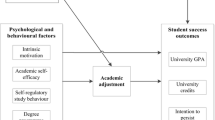Abstract
Students in higher education have to develop two types of expertise; the first refers to the mastery they want to acquire within a well defined occupational or disciplinary domain; the second relates to the deep level learning needed to achieve that mastery as an expert student or studax. Research has indicated that in solving a problem any expert simultaneously has to draw on four types of knowledge. Where the personal organisation of these four leads to effectiveness, this brings about the quintessence of expertise - experiencing problem solving behaviour as intrinsically motivating, or rewarding in itself. This intrinsic motivation integrates experiences of competence (through declarative knowledge), causality (through procedural knowledge), creativity (through situational knowledge) and self regulation (through strategic knowledge). The same will then necessarily hold for the student who proves, by experiencing this very same effectiveness, to be the studax or deep level learner higher education needs.
This paper describes a theory - studaxology - which explains to the student, on the basis of what is being experienced while studying, how to become organized as a person within the study environment, so as to succeed in the required task. Studaxology's core is a 3 × 3 matrix of study experiences, based on that number of sources of variance, empirically identified by means of factor analysis of Likert-type items in study inventories. Its central experience of intrinsic motivation brings together four pairs of complementary experiences (ability vs. difficulty, effort vs. relevance, intention vs. demand and time perspective vs. discipline), with each pair constituting a basic component of intrinsic motivation, and as such reflecting a specific form of metacognitive knowledge. Adequate interpretation and use of the 3 × 3 scores on a similar study inventory enable the studax effectively to meet deep level learning that optimal functioning in higher education demands. Factor analyses of students evaluations of lecturing behaviours can also be fitted into a 3 × 3 matrix equivalent to that of the studax. It is argued from these analyses that the essential prerequisites for achieving studaxological expertise stem from an appropriate initial vocational choice (which will help to produce an internally well-cohering 3 × 3 matrix of experiences) and are further enhanced by an equivalent matrix of lecturing behaviours designed to support students' own study experiences.
Similar content being viewed by others
References
Antonovsky, A. (1987). Unraveling the Mystery of Health: How People Manage Stress and Stay Well. San Francisco/London: Jossey Bass Inc.
Ausubel, D.P. (1963). The Psychology of Meaningful Verbal Learning. An Introduction to School Learning. New York: Grune and Stratton.
Biggs, J.B. (1979). ‘Individual differences in study processes and the quality of learning outcomes’, Higher Education 8, 381–394.
Das, J.P., Kirby, J.R. and Jarman, R.F. (1975). ‘Simultaneous and successive synthesis: An alternative model for cognitive abilities’, Psychological Bulletin 82, 87–103.
De Neve, H.M.F. (1991). ‘University teachers' thinking about lecturing: Student evaluation of lecturing as an improvement perspective for the lecturer’, Higher Education 22(1), 63–91.
De Neve, H.M.F. and Janssen, P.J. (1982). ‘Validity of student evaluation of instruction’, Higher Education 11, 543–552.
Entwistle N.J. and Marton, F. (1994). ‘Knowledge objects: Understanding constituted through intensive academic study’, British Journal of Educational Psychology 64, 161–178.
Entwistle N.J. and Ramsden, P. (1983). Understanding Student Learning. London: Croom Helm.
Glaser, R. (1986). ‘Intelligence as acquired proficiency’, in Sternberg, R.J. and Detterman D.K. (eds.), What Is Intelligence? Contemporary Viewpoints on Its Nature and Definition. Norwood: Ablex Publishing Corp.
Heider, F. (1958). The Psychology of Interpersonal Relations. New York: Wiley.
Janssen, P.J. (1989). ‘Task, development, and process in student learning: Towards an integrated theory of studying’, European Journal of Psychology of Education 4(4), 469–488.
Janssen, P.J. (1991). ‘On the construct and nomological validity of student descriptions of studying and lecturing by means of Likert type questionnaires: A 3 × 3 matrix of 9 common ‘primary’ factors’, in Carrero, M., Pope, M., Simons R.J., and Pozo J.L. (eds.), Learning and Instruction; European Research in an International Context: Volume III. Oxford: Pergamon Press.
Janssen, P.J. and De Neve H. (1988). Studeren en doceren aan het Hoger Onderwijs; vakmanschap als leeropdracht. Leuven: Acco.
Kolb, D.A. (1984). Experiential Learning: Experience as the Source of Learning and Development. Englewood Cliffs (N.J.): Prentice Hall.
Marsh, H.W. and Bailey, M., (1993). ‘Multidimensional students' evaluations of teaching effectiveness: a profile analysis’, Journal of Higher Education 64(1), 1–18.
Marton, F. and Säljö, R. (1976). ‘On qualitative differences in Learning. 1. Outcome and process. 2. Outcome as a function of learner's conception of the task’, British Journal of Educational Psychology 46, 4–11 and 115–127.
Meyer, J.H.F. (1991). ‘Study orchestration: the manifestation, interpretation and consequences of contextualised approaches to study’, Higher Education 22, 297–316.
Nuttin, J.R. (1984). Motivation, Planning and Action: A Relational Theory of Behavior Dynamics. Leuven: Leuven University Press and Lawrence Erlbaum Associates.
Pask, G. (1976). ‘Conversational techniques in the study and practice of education’. British Journal of Educational Psychology 46, 128–148.
Polya, G. (1973). How to Solve It: A New Aspect of Mathematical Method. Princeton (N.J.), Princeton University Press.
Rumelhart, D.E. and Norman, D.A. (1978). ‘Accretion, tuning and restruction: three modes of learning’, in Cotton, J.W.X. and Klatsky (eds.), Semantic Factors in Cognition. Hillsdale (N.J.): Academic Press.
Sternberg, R.J. (1985). Beyond IQ: A Triarchic Theory of Human Intelligence. Cambridge: Cambridge University Press.
Stipek, D. (1993). Motivation to Learn: From Theory to Practice. Boston (Mass), Allyn and Bacon.
Weiner, B. (1986). An Attributional Theory of Motivation and Emotion. New York: Springer Verlag.
Author information
Authors and Affiliations
Rights and permissions
About this article
Cite this article
Janssen, P.J. Studaxology: the expertise students need to be effective in higher education. High Educ 31, 117–141 (1996). https://doi.org/10.1007/BF00129110
Issue Date:
DOI: https://doi.org/10.1007/BF00129110




